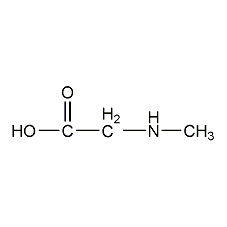Sarcosine Sarcosine


Structural formula
| Business number | 02W5 |
|---|---|
| Molecular formula | C3H7NO2 |
| Molecular weight | 89.09 |
| label |
N-methylglycine, N-methylaminoacetic acid, sarcosine, methylaminoacetic acid, Methylaminoacetic Acid, N-Methylglycine, N-Methylglycocoll, CH3NHCH2COOH |
Numbering system
CAS number:107-97-1
MDL number:MFCD00004279
EINECS number:203-538-6
RTECS number:VQ2897000
BRN number:1699442
PubChem number:24899761
Physical property data
1. Properties: white orthorhombic crystal. Slightly sweet. 2. Density (g/mL, 25℃): Not determined
3. Relative vapor density (g/mL, air=1): Not determined
4. Melting point (ºC): 208- 212
5. Boiling point (ºC, normal pressure): Undetermined
6. Boiling point (ºC, kPa): Undetermined
7. Refractive index ( D20): Not determined
8. Flash point (ºC): Not determined
9. Specific rotation ( ºC): Not determined
10. Autoignition point or ignition temperature (ºC): Not determined
11. Vapor pressure (mmHg, 20ºC): Not determined
12. Saturated vapor pressure (kPa, ºC): Undetermined
13. Heat of combustion (KJ/mol): Undetermined
14. Critical temperature (ºC): Undetermined Determined
15. Critical pressure (KPa): Undetermined
16. Log value of oil-water (octanol/water) partition coefficient: Undetermined
17 . Explosion upper limit (%, V/V): Undetermined
18. Explosion lower limit (%, V/V): Undetermined
19. Solubility: soluble in water, Ethanol and dilute ethanol are insoluble in ether.
Toxicological data
1. Acute toxicity: Rat oral LD5O: >2000mg/kg
Ecological data
This substance is slightly hazardous to water.
Molecular structure data
1. Molar refractive index: 21.10
2. Molar volume (cm3/mol): 81.4
3. Isotonic specific volume (90.2K ): 201.2
4. Surface tension (dyne/cm): 37.1
5. Polarizability (10-24cm3): 8.36
Compute chemical data
1. Reference value for hydrophobic parameter calculation (XlogP): None
2. Number of hydrogen bond donors: 2
3. Number of hydrogen bond acceptors: 3
4. Number of rotatable chemical bonds: 2
5. InterconversionNumber of isomers: None
6. Topological molecule polar surface area 49.3
7. Number of heavy atoms: 6
8. Surface charge: 0
p>
9. Complexity: 52.8
10. Number of isotope atoms: 0
11. Determine the number of atomic stereocenters: 0
12 .The number of uncertain atomic stereocenters: 0
13. The number of determined chemical bond stereocenters: 0
14. The uncertain number of chemical bond stereocenters: 0
15. Number of covalent bond units: 1
Properties and stability
Avoid contact with moisture.
Storage method
Stored in a cool, ventilated warehouse. Keep away from fire, heat and water sources. should be kept away from oxidizer, do not store together. Equipped with the appropriate variety and quantity of fire equipment. The storage area should be equipped with emergency release equipment and suitable containment materials.
Synthesis method
It is obtained by leaching the bark (phloem) of Quillaia saponaria with hot water or aqueous ethanol, adding ether or acetone to precipitate it, and then recrystallizing and refining it. The main component is saponin (Quillaja saponin, etc.). The tree mainly grows wild in Chile, Bolivia and other places in South America, and is also found in China.
Purpose
Biochemical reagents, dye stabilizers, daily chemicals, amino acid surfactants, health care drugs, fatigue recovery agents, etc. Biochemical research. Synthesis of antienzyme agents.